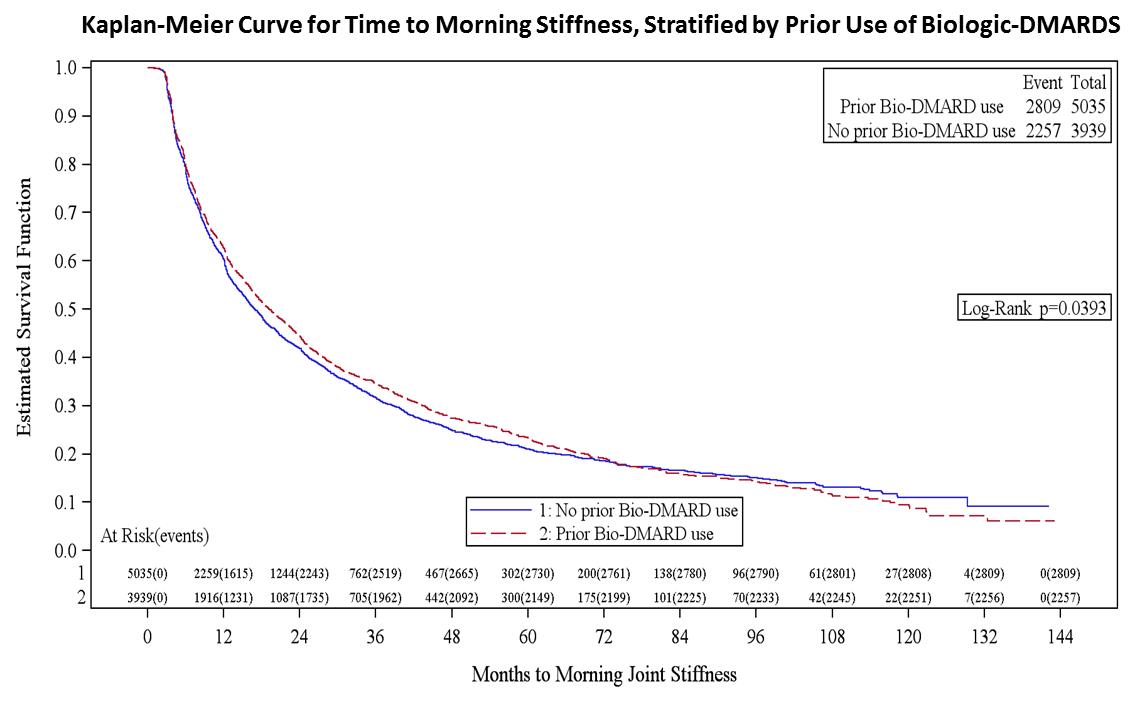Session Information
Title: Rheumatoid Arthritis - Clinical Aspects: Novel Biomarkers and Other Measurements of Disease Activity
Session Type: Abstract Submissions (ACR)
Background/Purpose : Morning stiffness is a symptom of rheumatoid arthritis (RA) that is frequently reported and thought to reflect disease activity, but its etiology is poorly understood.
Methods: Using the Corrona RA registry, data from RA patients enrolled from October 2001–February 2014 were evaluated cross sectionally at: enrollment and last visit between January 2013 and February 2014 for those with at least one visit during that interval. Longitudinal data from 2003 to 2014 were summarized to estimate changes in prevalence of morning stiffness over time reported by all Corrona RA patients.
Results : Prevalence of morning stiffness at enrollment was 74.1% and at last visit was 69.9%; mean (SD) duration 1.7 hours (± 3.1) and 1.5 hours (± 3.0), respectively. Approximately 50% of patients reporting morning stiffness with a duration ≥ 1 hour at last visit. Patients with morning stiffness were significantly less likely to be working 39.2% vs 47.3% and were more likely to have a BMI ≥ 30 (42.2% vs 29.9%) at last visit. Similar rates of treatment with biologic DMARDs as mono therapy or in combination with non-biologic DMARDs were observed in patients with and without morning stiffness. Among patients with no reported morning stiffness at time of enrollment, time in months to first visit with reported morning stiffness was not significantly different between patients with or without prior biologic DMARD experience(Figure 1).
Conclusion : Morning stiffness continues to be reported by a high proportion of US patients despite treatment with non-biologic and biologic DMARDs and the overall prevalence has remained relatively stable over the past 10 years. Patients reporting this symptom were also more likely to be not working. More research is needed to better understand how to manage morning stiffness in clinical practice.
Disclosure:
V. Strand,
AbbVie, Afferent, Amgen, Biogen Idec, Bioventus, BMS, Carbylan, Celgene, Celltrion, CORRONA, Crescendo, Genentech/Roche, GSK, Hospira, Iroko, Janssen, Lilly, Merck, Novartis, Pfizer, Regeneron, Sanofi, SKK, Takeda, UCB, Vertex,
5,
Up to Date,
7;
R. J. Holt,
Horizon Pharma, Inc.,
5;
K. C. Saunders,
Corrona, LLC.,
3;
J. D. Kent,
Horizon Pharma, Inc.,
1,
Horizon Pharma, Inc.,
3;
P. Xu,
Axio Research, LLC,
3;
A. Y. Grahn,
Horizon Pharma, Inc,
1,
Horizon Pharma, Inc.,
3;
M. Mason,
Corrona, LLC.,
3,
NIH,
6;
C. J. Etzel,
Corrona, LLC.,
3.
« Back to 2014 ACR/ARHP Annual Meeting
ACR Meeting Abstracts - https://acrabstracts.org/abstract/prevalence-of-morning-stiffness-in-a-us-registry-population-of-rheumatoid-arthritis-patients/

